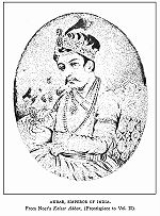
Akbar the Great
Overview
Akbar also known as Shahanshah
Akbar-e-Azam or Akbar the Great (14 October 1542 – 27 October 1605), was the third Mughal Emperor
. He was of Timurid
descent; the son of Emperor Humayun
, and the grandson of the Mughal Emperor Zaheeruddin Muhammad Babur
, the ruler who founded the Mughal dynasty in India. At the end of his reign in 1605 the Mughal empire covered most of the northern and central India. He is most appreciated for having a liberal outlook on all faiths and beliefs and during his era, culture and art reached to zenith as compared to his predecessors.
Akbar was thirteen years old when he ascended the Mughal throne in Delhi
(February 1556), following the death of his father Humayun.
King of Kings
King of Kings is a title that has been used by several monarchies and empires throughout history. The title originates in the Ancient Near East. It is broadly the equivalent of the later title Emperor....
Akbar-e-Azam or Akbar the Great (14 October 1542 – 27 October 1605), was the third Mughal Emperor
Mughal Empire
The Mughal Empire , or Mogul Empire in traditional English usage, was an imperial power from the Indian Subcontinent. The Mughal emperors were descendants of the Timurids...
. He was of Timurid
Timurid Dynasty
The Timurids , self-designated Gurkānī , were a Persianate, Central Asian Sunni Muslim dynasty of Turko-Mongol descent whose empire included the whole of Iran, modern Afghanistan, and modern Uzbekistan, as well as large parts of contemporary Pakistan, North India, Mesopotamia, Anatolia and the...
descent; the son of Emperor Humayun
Humayun
Nasir ud-din Muhammad Humayun was the second Mughal Emperor who ruled present day Afghanistan, Pakistan, and parts of northern India from 1530–1540 and again from 1555–1556. Like his father, Babur, he lost his kingdom early, but with Persian aid, he eventually regained an even larger one...
, and the grandson of the Mughal Emperor Zaheeruddin Muhammad Babur
Babur
Babur was a Muslim conqueror from Central Asia who, following a series of setbacks, finally succeeded in laying the basis for the Mughal dynasty of South Asia. He was a direct descendant of Timur through his father, and a descendant also of Genghis Khan through his mother...
, the ruler who founded the Mughal dynasty in India. At the end of his reign in 1605 the Mughal empire covered most of the northern and central India. He is most appreciated for having a liberal outlook on all faiths and beliefs and during his era, culture and art reached to zenith as compared to his predecessors.
Akbar was thirteen years old when he ascended the Mughal throne in Delhi
Delhi
Delhi , officially National Capital Territory of Delhi , is the largest metropolis by area and the second-largest by population in India, next to Mumbai. It is the eighth largest metropolis in the world by population with 16,753,265 inhabitants in the Territory at the 2011 Census...
(February 1556), following the death of his father Humayun.
Unanswered Questions
Discussions

